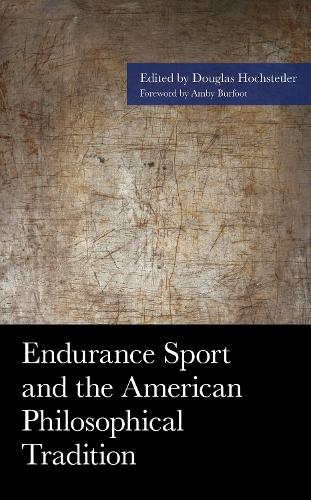
Endurance Sport and the American Philosophical Tradition
(Hardback)
Available Formats
Publishing Details
Endurance Sport and the American Philosophical Tradition
By (Author) Douglas Hochstetler
Foreword by Amby Burfoot
Contributions by Douglas Anderson
Contributions by Kaarina Beam
Contributions by Cody D. Cash
Contributions by Tim Elcombe
Contributions by Jeffrey Fry
Contributions by Shaun Gallagher
Contributions by Peter Hopsicker
Contributions by Professor Daniel D. Hutto
Bloomsbury Publishing PLC
Lexington Books
15th January 2020
United States
Classifications
Professional and Scholarly
Non Fiction
Exercise and workouts
Philosophy
Sport: general
613.7101
Physical Properties
Hardback
210
Width 161mm, Height 229mm, Spine 21mm
513g
Description
Endurance Sport and the American Philosophical Tradition, edited by Douglas R. Hochstetler, analyzes the relationship between endurance sportssuch as running, cycling, and swimmingand themes from the American philosophical tradition. The contributors enter into dialogue with writers such as Ralph Waldo Emerson, William James, Henry David Thoreau, and John Dewey, as well as more recent scholars such as John McDermott and bell hooks. Examining American philosophical themes informs issues in endurance sport, and the experiential nature of endurance sport helps address philosophical issues and explain philosophical themes in American philosophy. The chapters bear witness to the fact that philosophy is not limited to abstract notions such as justice, truth, happiness, and so forth, but intersects with and has a bearing on our human endeavors of work and play. Furthermore, the themes centrally related to the American philosophical tradition align closely with the challenges and experiences present and faced by runners, cyclists, swimmers, and endurance athletes in general.
Reviews
Readers may wonder whether this book, as edited by Hochstetler (Pennsylvania State Univ. Lehigh Valley), represents the response of its various authors to the modern growth of endurance sport or to life in a world that rarely allows for time to be with oneself. Perhaps it is both, with contributing authors examining in the process the foundations of the American philosophical tradition. Hochstetler asks "to what extent, and in what ways, does endurance sport play at least a small part in our quest to live a meaningful and gathered life in a world that is so harried" This question is examined through the lens of American philosophical thinking in the nine essays gathered here. These are densely written pieces, demanding that readers take time to contemplate and reflect. Only athletes thoroughly devoted to their craft would attempt to run a fifty-mile race. So too should the reader of this text be schooled in philosophical reasoning. The demand on readers ensures that this book is not for novices, but the reward for those willing to engage with the text is a highly stimulating, even life-changing examination of the aspiration and training required for performance in endurance sport. Summing Up: Highly recommended. Upper-division undergraduates through faculty; professionals.
Author Bio
Douglas Hochstetler is professor of kinesiology and interim director of academic affairs at Penn State University, Lehigh Valley.
